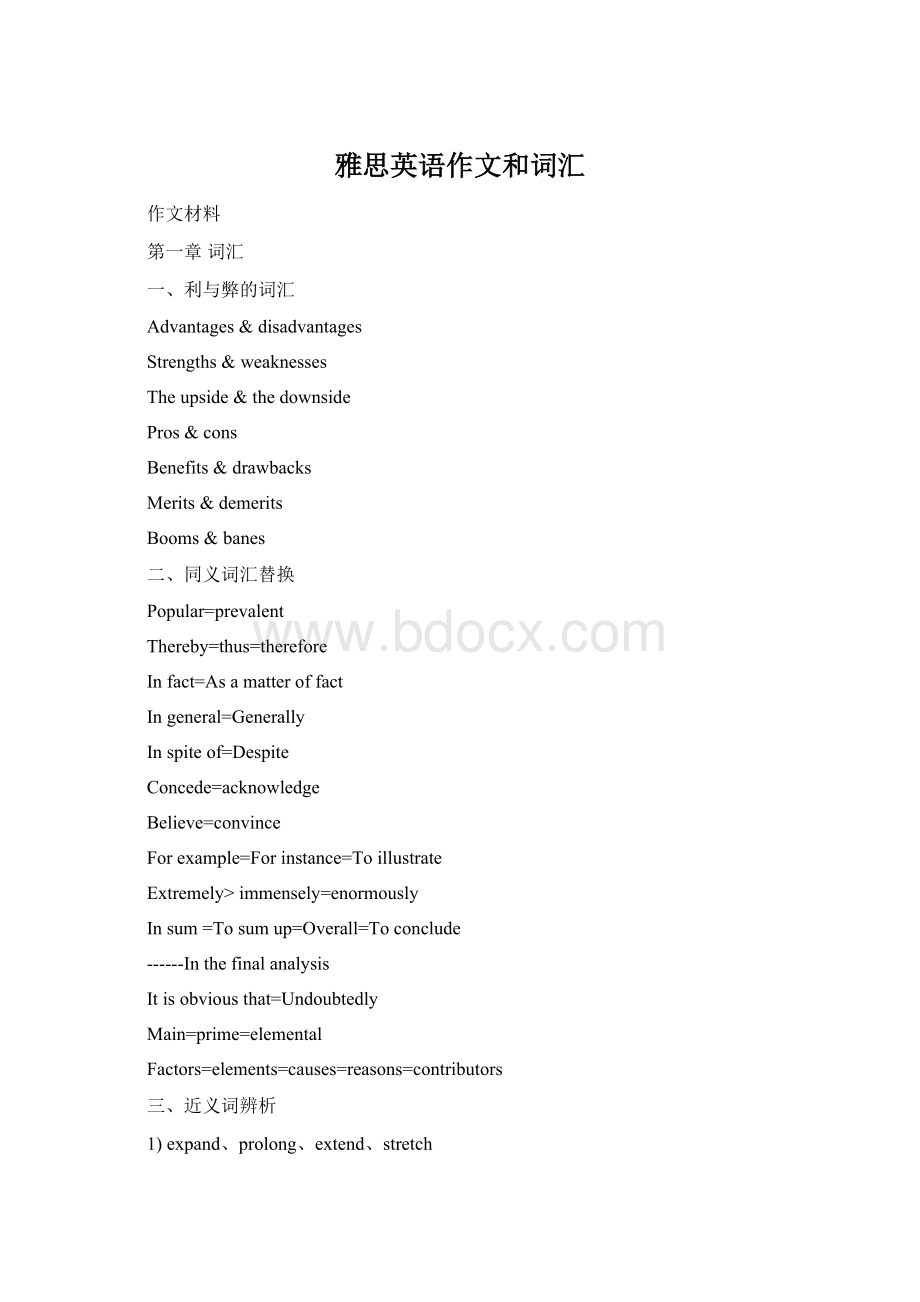雅思英语作文和词汇Word格式文档下载.docx
《雅思英语作文和词汇Word格式文档下载.docx》由会员分享,可在线阅读,更多相关《雅思英语作文和词汇Word格式文档下载.docx(37页珍藏版)》请在冰豆网上搜索。

Prolong:
延长,拉长,拖延(空间,时间)
Extend:
扩充,延伸(vi空间、土地延展,时间延续)(vt.舒展身体某部位)
Stretch:
延展,延长(事物长度,宽度;
规定或者时间超出规定的范围&
限度)、
(v.伸展肢体)
2)locate、lie
Locate:
vt位于,使坐落于(用于被动语态belocatedin)
Lie:
vi位于
3)capacity、ability
Capacity:
能力,才干(先天、理解、接受、忍受);
也指物体容纳能力
capacityfor;
capacitytodo
Ability:
能力,才干(先、后天;
脑、体力;
实际应用)
Abilitytodo或in/forsth
4)establish、build、construct、found
Establish:
建立,建设(强调稳固建成;
具体/抽象物品)
Build:
建筑,建造(建筑物;
理论、体系抽象事物)
Construct:
与build通用,更正式些
Found:
建立,创立(奠基,打下基础)
5)injure、hurt、harm、damage、destroy
Injure:
伤害,损害(健康,名誉,情感,智力)
Hurt:
伤害,损伤,损害(肉体,精神痛苦)
Harm:
伤害,损害(肉体,精神;
抽象,具体事物)
Damage:
损伤,损害(无生命物体)
Destroy:
破坏,损坏(彻底损坏,不能或很难修复)
6)incident、accident、affair、case、event、matter
Incident:
事件、事变(一般指与重大事件相关的次要事件,尤指不寻常、激烈
暴力的事件,如borderincident边境事件)
Accident:
意外事件,事故如trafficaccident
Affair:
事件,事务;
私事(公共事件,政治事务,个人事务,如foreignaffairs
外交事务)
Case:
事件,事例(强调典型的实例,事例,实情)
Event:
事件,事变(重要,值得关注的大事,多用于历史,政治事件)
Matter:
事情,事件(应该处理,考虑的具体事情)
7)significant、considerable、enormous、numerous
Significant:
相当数量的,意义重大的(强调数量上非常大,或者有重要影响的)
英文解释:
largeenoughtobenoticeableorhavenoticeableeffects
Considerable:
相当大的,相当多的(大小,范围,数量,程度)
英文解释:
fairlybiginamountorsize,especiallylargeenoughtohave
aneffectorbeimportant
Enormous:
巨大的,庞大的(大小,范围,数量程度)
verybiginsizeorinamount
Numerous:
众多的,许多的
verymany
8)continuous、continual
Continuous:
连续的,持续的(时间,顺序上无间断)
Continual:
连续的,频繁的(重复,可能有间隔,但会重新开始)
9)elderly、old、elder、older
Elderly:
年长的,年老的(只修饰人,人已过中年;
对人尊敬、礼貌)
Old:
年老的,老的(修饰人时,只强调年龄大;
修饰事物theoldsociety)
Elder:
年长的,old比较级,只做定语;
不能与than连用引导比较状语从句
Older:
年长的,old比较级,常作表语,可与than连用引导比较状语从句
10)besides、inaddition、except、exceptfor
Besides:
除了...:
除了...,还....BesidesEnglish,westudyFrench.
Inaddition:
用法同上
Except:
除了,除...之外(强调不包括)出去的与没除去的为同类
WeallwentthezoolastSundayexceptBill
Exceptfor:
除...之外(肯定全部,局部否定;
出去的和没除去的不是同类事物)
Youressayisgood,exceptforsomespellingmistakes.
11)excessive、additional
Excessive:
过多的,过分的,过度的(超过了所需,有“泛滥”的意思)
Additional:
额外的,另外的
12)unique、peculiar、strange
Unique:
独一无二的,绝无仅有的
Peculiar:
独特的,不寻常的;
怪异的(人,物)
Strange:
令人感到奇怪的,出人意料的;
难以解释的,难以理解的
13)alter、change、shift、transform、vary
Alter:
改变(事物局部改变,如形式,外观,细节等轻微的方面)
Change:
变化,改变,转变(数量,质量,外表或本质)
Shift:
改变(位置、方向改变,立场、态度改变)
Transform:
改变,转换,改造(强调彻底改变形状,外观,性质)
Vary:
变化,改革(事物有各种变化或在不同时间有不同变化)
14)basis、base、basic
Basis:
基础,基本,根据(抽象事物,如学说,讨论,信念)
Base:
基,底;
基础;
基地(具体事物,军事基地)
Basic:
<
n>
基本要素,基本原理,基础(常复数)
15)favorite、favorable
Favorite:
喜爱的,钟爱的;
特别喜爱的人(事物)
Favorable:
赞成的;
有利的;
讨人喜欢的
16)neglect、ignore、overlook
Neglect:
忽视,疏忽(无意识的)+todo....
Ignore:
忽视(有故意的含义)
Overlook:
疏忽,没注意到;
无视,忽略(有无意识均可)
17)slight、trivial
Slight:
程度小的,数量小的
Trivia:
不重要的,没有价值的
18)strain、tension
Strain:
紧张(疲劳;
困难)
Tension:
紧张(人、关系、局势)
19)delivery、transmission
Delivery:
递送,传送(信件,货物)
Transmission:
传送,传播;
传输(电波,信息发送,以及把某物从某处传送至另一处的过程)
20)fee、fare、cost
Fee:
费,费用(学费,会费;
给脑力劳动者,医生的酬金)
Fare:
费用(车费,如汽车,电车,计程车的费用、票价)
Cost:
费用,价格(购买物品、接受服务的花费;
付出精力)
21)location、position、scene
Location:
位置,场所(强调固定位置;
外景)
Position:
位置,职位(具体所处的位置;
抽象职位)
Scene:
位置,发生地点(侧重真实事件的发生地、现场)
22)preserve、maintain、retain
Preserve:
保持,保护(使完整,不受破坏)
Maintain:
维持,保持(维持下去;
保持良好状态)
Retain:
包;
保留,保存(继续保留、保存原来的东西)
23)proportion、rate
Proportion:
比,比例(物体在大小、数量的比例)
Rate:
比率(部分占整体的比例,比率)
24)undergo、tolerate
Undergo:
经历,遭受(强调忍受)
Tolerate:
经历(强调默认存在,强制自己接受,可能没有经历过)
三、关系词
(一)因果关系(causeandeffect)
1、原因
1)as=since因为
这两个词只能跟从句,不能跟词<
conj.>
2)
Dueto
Owingto=thanksto=asaresultof
只能接名词,不能跟动词
2、结果
1)因此
Hence=thus=therefore因此
句首句中均可,如果用于句中,则需分号,后面跟着被引导的从句。
2)作为结果
Asaconsequence=asaresult=consequently
用在句首较多,后面用句号。
3)因此
Sothat用于句中
4)以此达到...目的
Thereby不能用于句首,而且正是英语中后面接动名词。
EXAMPLES:
1.
汉:
因此,对工作的感觉一定会体现出一个人是如何看待自己的人生的。
英:
Sofeelingsaboutone’sjobmustreflecthowanindividualfeelsabouthisorherlifeasawhole.
2.
生态环境正在被恶化;
因此,我们必须采取措施解决环境污染。
Theecologicalproblemsarebeingaggravated;
therefore,itissignificant/imperativethatwetakemeasurestocombatthepollutionintheenvironment.
3.
政府应当提高公众的环境保护意识;
以此来促进可持续发展并且创造一个更适合人类生存的环境。
Thegovernmentshouldraisepublicawarenessofenvironmentalpreservation,therebypromotingsustainabledevelopment&
creatingamorelivableenvironment.
(二)举例关系(exemplification)
1、以...为例
Take...forexample省略号中只能填名词
2、比如...
Forinstance=forexample
3、
Thispointisbestillustratedwiththeexampleof...这个观点可以用...的例子最有力的证明
Thispointcanbeconfirmedbytheexampleof...这个观点可以被...例子支持
(二者后面接名词)
4、以..为例
consider...forexample省略号中填入名词或者that从句均可
5、...是一个恰当的例子。
...isacaseinpoint省略号中填名词
汉:
普遍认为,一些人天生就有一定的才能,比如对于运动和音乐的天赋,而另一些人没有。
英:
Itisgenerallybelievedthatsomepeoplearebornwithcertaintalents,forinstance,forsportsormusic,andothersarenot.
亚洲国家正以惊人的速度变得西方化。
以中国为例,当青少年去看电影的时候,他们一般都选择好莱坞大片而不选择国产电影。
TheAsiancountriesaregettingwesternizedatastaggeringrate.TakeChinaforexample,whenyoungstersgotothemovies,itiscommonforthemtochooseHollywoodblockbustersoverdomesticfilms.
(三)对比关系(comparisonandcontrast)
While=whereas=whilst
用在句首和从句中,表示主句和从句的对比(句内对比)
By/incontrast用在句首,表示前一个句子和它引导的句子之间的对比(句间对比)
EXAMPLE:
现代人类生活压力很大,而我们的祖先却可以比较悠闲地从事他们的事务。
While/whilstmodernmanleadsastressfullife,ourancestorscouldoftenperformtheirbusinessinaleisurelyfashion.
大城市的教育和医疗设施多数很先进。
相比之下,他们在乡村的对应设施多半质量较差。
Theeducational&
medicalfacilitiesinbigcitiesaremostlyveryadvanced.In/Bycontrast,theircounterpartsinthecountrytendtobeofinferiorquality.
(四)让步关系(concession)
1.尽管
Despite=inspiteof=notwithunderstanding后面跟名词或者代词。
2.尽管如此
Nonetheless=nevertheless后面跟完整句子。
3.尽管
Eventhough很多时候可替换although,后面跟从句,表示已经存在的状况让步。
4.即使
Evenif后面跟从句,表示对还没有发生的状况让步
5.只要
Aslongas用在句子中间,口语、写作很常用
Idon’tcarewhoyouare,whereyou’refromorwhatyoudidaslongasyouloveme.
------BackstreetBoys
6.尽管
Albeit一般用于句子中间,后跟形容词。
尽管让所有员工都满意并不太可能,但我认为提高任何工作中的满意度都是现实的
Eventhough,itislikelythatallworkersdofeelhappyintheirwork,Ithinkitisnotunrealistictopromotemorejobsatisfactioninanyjob.
政府在科学研究中起关键作用;
尽管如此,私人公司在从事科学研究方面还是有特定的优势。
Thegovernmentplaysacrucialroleinscientificresearch;
nonetheless,privatecompaniesholdcertainadvantagesinconductingscientificresearch.
(四)假设关系(supposition)
如果Providedthat...后面结果一般是希望看到的
If后面结果也可以是我们不希望看到的
如果我们可以尽可能减少实验动物的痛苦,那么动物实验应当继续。
Providedthatweshouldminimizethepainofthetestanimals,animalsexperimentationshouldbecontinued.
如果大公司被搬到乡村,城市里的交通堵塞将被显着的缓解。
Iflargecompaniesaremovetothecountryside,thetrafficjaminthecitieswillbealleviatedsubstantially.
第二章作文的句型模板
一、report模板
1.开头段:
介绍背景并引出话题
1)Inthisdayage,theissueof…hasdrawnwidespreadattention.Inthisessay,Iwillanalyzesomepossiblecausesofthisphenomenonandtheproposesolutions.
2)Currently,…Iscausinggreatconcern.Inthisessay,Iintendtoexplorethecausesandthesolutionsofthisissue.
2.主体段1:
写原因,三个原因丙并写一个支持句
1)Itisobviousthatthecausesof…arediverse.Inthefirstplace…forexample…inthesecondplace…Specifically…thirdly…Itseemsthat…
2)Obviously,thecausesof…arehighlycomplex.Firstly,…Itisevidentthat…Secondly,…forinstance…Thirdly,…Itseemsthat…
3.主体段2:
写解决方案,三个解决方案并各写一句支持句
1)Accordingly,thesolutionstothisissueshouldalsobevaried.First,…Forexample,…then,…Indeed,…Aboveall,researchhasprovedthat…
2)Inlightoftheabovefactors,Iamconvincedthatimmediateactionshouldbetakentocombatthissituation.Priorityshouldbegivento…Forinstance…Besides,…thisisduetotheconsiderationthat…mostimportantly,…clearly,…
4.结尾段:
总结
1)Toconclude,severalfactorscontributeto…Iamconvincedthatweshouldtakeimmediatemeasures(including…)tosolvethisdisturbingproblem.
2)Insummary,thereasonsof…arecomplicated;
therefore,weshouldtakeawiderangeofmeasures(including…)toaddressthisproblembeforethedamagecausedbythistrendbecomesirreversible.
二、Argumentation开头
1)介绍背景的经典句式
(1)…isplayingasignificantroleinthecontemporarysociety.(positive)
(2)Thereisagrowingtendencyforsomebodytodosomething.
(3)Inthepresentage,theissueof…isincreasinglydisturbing.(negative)
2)直接点题的经典句式
(1)Inthiscontemporarysociety,whether…isablessingoracursehassparkedmuchdebate.
(2)Inthisdayandage,therehasbeenmuchdiscussionsurroundingtheissueof(whether)…
(3)Peoplestillhavemixed/divergentconsensuson(whether)…
(4)Peoplearehavingahardahardtimereachingconsensuson(whether)…
(5)Concerning,theissueofwhether…
(6)Atopicnowunderdebate/discussionisthat…
3)转述原题经典句型
(1)Somepeoplearguethat…whilemanyotherscontendthat
(2)Somepeoplearguethat…,ontheotherhand,manyotherscontendthat
4)表达观点经典句式
(1)Personally,Iaminfavorofthisviewpoint.(support)
(2)Formypart,Iagreewiththeformer/latterview.(support)
(3)AsfarasIamconcerned,Iaminclinedtobeonthesideoftheformer/latterview.
(4)Frommyownperspective,Idonotthinkthisviewpointisjustified.(object)
(5)Icanhardlyshareconsenttothisproposalbe